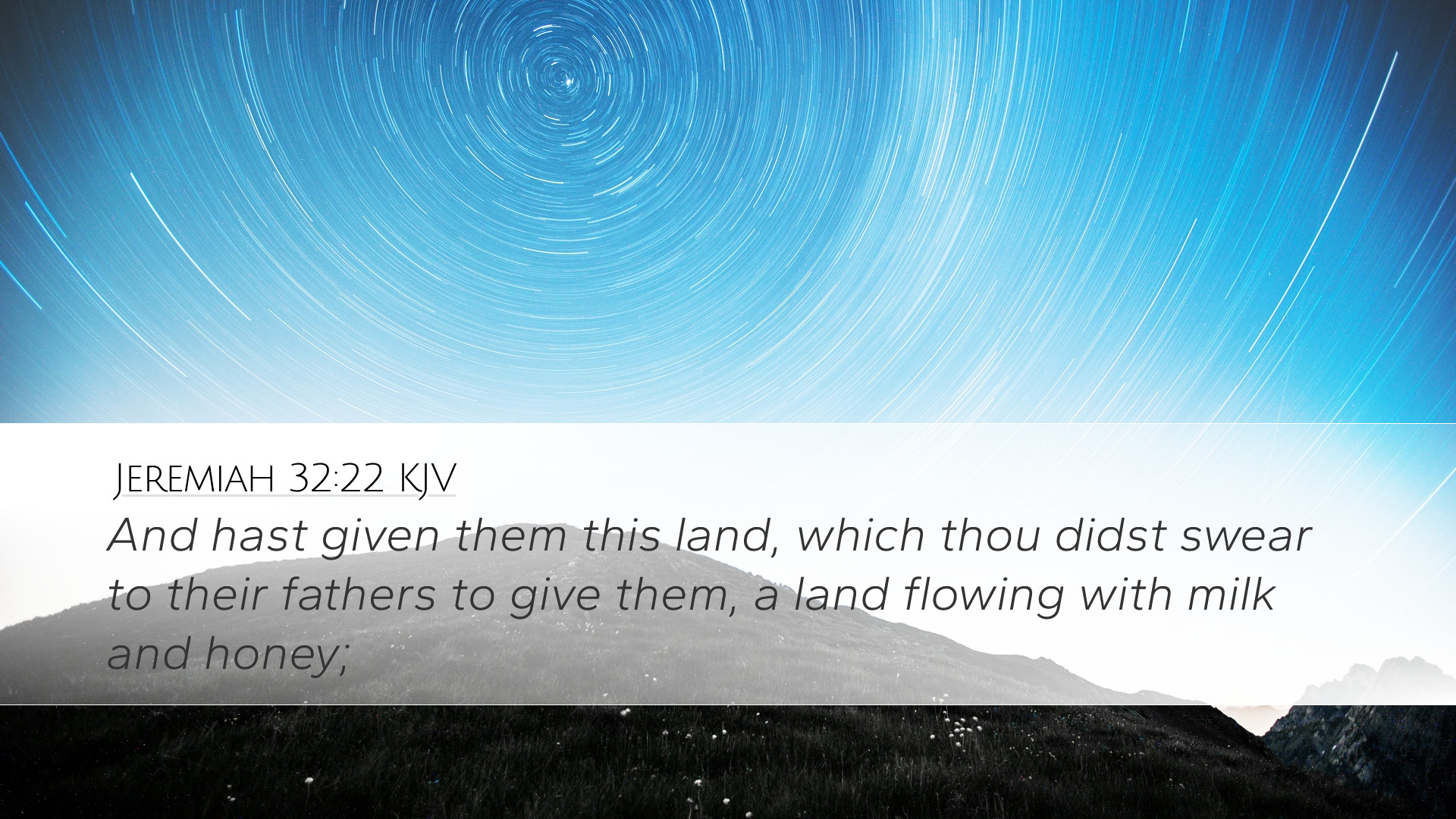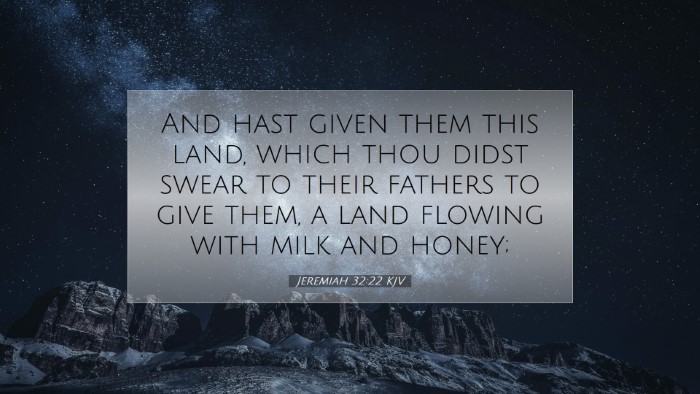Commentary on Jeremiah 32:22
Jeremiah 32:22: "And hast given them this land, which thou didst swear to their fathers to give them, a land flowing with milk and honey."
Introduction
The verse Jeremiah 32:22 stands as a significant declaration of God's faithfulness to His covenant with Israel. It encapsulates the essence of divine promise and the enduring nature of God's relationship with His people. In this commentary, insights from respected public domain scholars such as Matthew Henry, Albert Barnes, and Adam Clarke will be synthesized to explore the theological implications, historical context, and pastoral applications of this verse.
Context and Historical Background
To fully appreciate the depth of Jeremiah 32:22, it is essential to examine its historical setting. Jeremiah prophesied during a time of great turmoil for Judah. The Babylonian siege was imminent, and the nation was on the verge of destruction. This backdrop of crisis highlights the weight of God's promise as Jeremiah reminds the people of their inheritance—the land of Canaan, which was given to them as part of God's covenant with their ancestors.
- Divine Assurance: Despite the surrounding calamity, God assures His people of His unwavering commitment.
- Covenant Fulfillment: The land signifies the fulfillment of God's promises made to the patriarchs, reinforcing the idea that God is a covenant-keeping God.
Theological Insights
Commentators offer various theological perspectives on this verse, emphasizing the constancy of God's promises amid human failures:
- The Nature of God's Promises: Adam Clarke notes the significance of the phrase "hast given them this land," suggesting that God's gifts are irrevocable. He emphasizes that while Israel may face judgment, the land remains a testament to divine fidelity.
- A Land Flowing with Milk and Honey: Albert Barnes interprets this phrase as a representation of abundance and sustenance. It signifies not merely physical prosperity but also spiritual richness bestowed upon God's people.
- The Fulfillment of Covenant: Matthew Henry beautifully encapsulates the idea that God’s assurance of land reflects His overarching redemptive plan for humanity. The land is not just a geographical location; it represents God’s providence and care for His people.
Paternal Relationship
This verse also amplifies the paternal relationship God has with His people. It is a reminder that, just as a loving father provides for his children, God provides an abundant land for His chosen ones. The promise of the land symbolizes not only provision but also protection and presence, indicating that God's people are never forsaken.
Matthew Henry emphasizes the importance of recognizing this paternal aspect, reminding believers of their identity as children of God, heirs to the promises made to their forefathers.
Pastoral Applications
For pastors and theologians, Jeremiah 32:22 provides rich material for preaching and teaching. Key applications include:
- Faithfulness in Crisis: This verse encourages leaders to remind their congregations of God’s faithfulness even when circumstances are dire. Just as God assured Israel, we can remind believers that His promises remain true today.
- Assurance of Provision: Pastors can draw parallels between the land flowing with milk and honey and the spiritual nourishment available in Christ. Believers are reminded that God desires to lead them into abundance, both materially and spiritually.
- Call to Trust: God’s promise in this verse calls for trust and reliance on His faithfulness. In teaching, leaders can encourage their congregations to embody a spirit of dependence on God’s promises despite prevailing doubts.
Conclusion
Jeremiah 32:22 serves as a powerful reminder of God's unyielding faithfulness to His people. It encapsulates profound theological truths about His nature as a promise-keeper and provider. In the midst of uncertainty, this verse offers comfort and assurance to believers, prompting them to reflect on their identity in Christ and the richness of the inheritance they possess. As Jeremiah’s words echo through the ages, they remind pastors, students, and scholars alike of the enduring nature of God’s covenant love.


